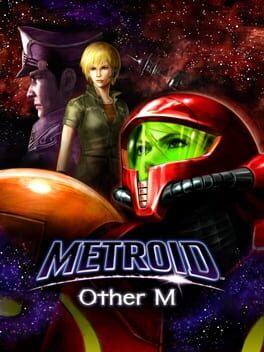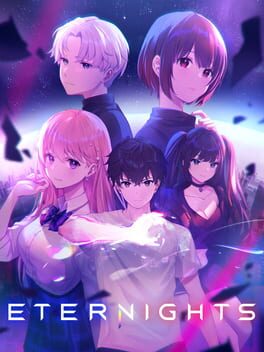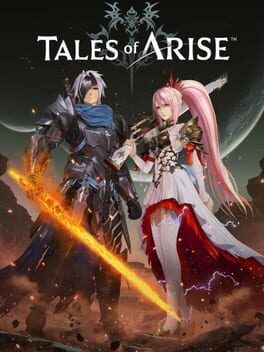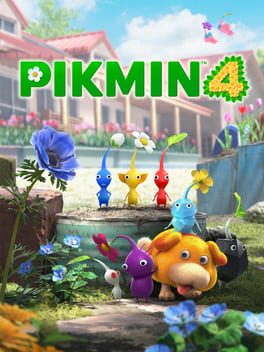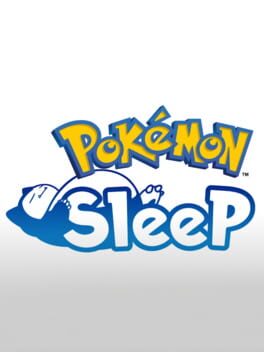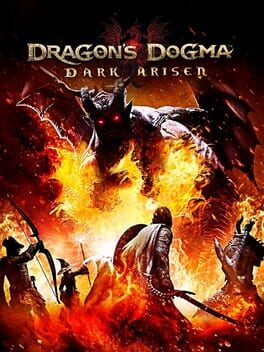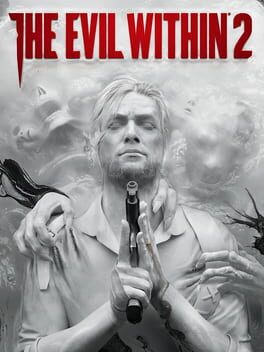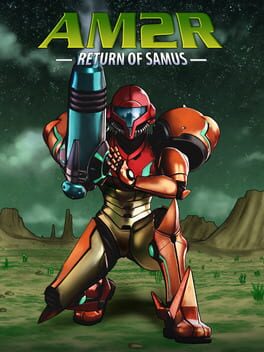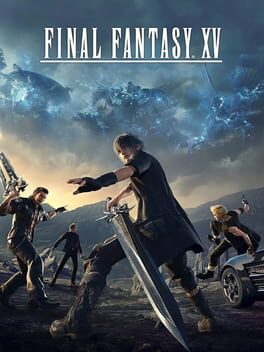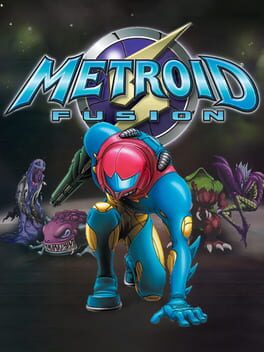Wistful
BACKER
72 Reviews liked by Wistful
Metroid: Other M
2010
I like it. Not even being contrarian. I just had fun with it. Leaves a lot to be desired. Melissa Bergman had the potential to be one of the most interesting Metroid villains ever but the writers of this game seemed to be allergic to that idea at the time. The visuals are great for a Wii game. Should've had a purple gravity suit though.
Eternights
2023
If you managed to find something genuinely enjoyable in this game, without a hint of irony, then you are truly the hero of this story.
Personally, I like playing and watching things that aren't good but they know they aren't good. So, yeah, I had some fun with this game, sharing screenshots and videos of its most stupid moments. However, once I paused, took a deep breath, and reflected on it, I couldn't help but think, "Wow, this is pretty terrible."
It's an indie game, and that fact is screaming at your face every time. There are plenty of indie developers out there who, aware of their limitations, endeavor to create experiences that prevent you from either finding them or unfavorably comparing them to similar bigger titles. Crafting a game that clearly draws inspiration from Persona but only incorporates its worse aspects is a flawed approach.
The point I'm getting at here is that I've spent a considerable amount of time discussing this game, which honestly shouldn't be the case. Let's move on. We've already got a strong contender for the title of "Worst Game of the Year."
Personally, I like playing and watching things that aren't good but they know they aren't good. So, yeah, I had some fun with this game, sharing screenshots and videos of its most stupid moments. However, once I paused, took a deep breath, and reflected on it, I couldn't help but think, "Wow, this is pretty terrible."
It's an indie game, and that fact is screaming at your face every time. There are plenty of indie developers out there who, aware of their limitations, endeavor to create experiences that prevent you from either finding them or unfavorably comparing them to similar bigger titles. Crafting a game that clearly draws inspiration from Persona but only incorporates its worse aspects is a flawed approach.
The point I'm getting at here is that I've spent a considerable amount of time discussing this game, which honestly shouldn't be the case. Let's move on. We've already got a strong contender for the title of "Worst Game of the Year."
Tales of Arise
2021
Tales of Arise steps forward for the series with visual finesse visaged through grandeouse scale of environments and dungeons.
The Tales of series has for the last entries been aligning for new directions to modernise the formula, and while both Berseria and especially Zestiria had their merits and gripes Arise's standards is a huge distinction in comparance.
Staying faithful to both the new and old, Arise takes elements from its more traditional brethrens and converts them into its own defining battle system, while retaining the same style of easy 3D exploration as the two former entries in its series.
Both combat and exploration is as clean, flashy and intuitive as the UI for menuing and map navigating both through the story campaign and actual fun sidequests with a few easy fetch quests and otherwise mostly others presenting cool sub bosses and some neat extra dungeons.
From beginning to end Tales of Arise is a harmonic treat with a range of diversity and alignment between Motoi Sakuraba's orchestral pieces to his full on metal tracks. You get both of his good sides of calm and energetic wrapped into one package of consistently great compositions all the way through, it's simply some of his best work.
The story's biggest strength is as it usually is for the series its set of indepth characters bantering and developing their own individual arcs, the story itself is servicable and does build up for a lot of cool showdowns and set pieces, while a few mysteries lingers for some pretty out there revelations as it goes on, unfortunately at its tip end it does get a bit farfetched and hard to digest, it still carries itself out with nice individual arcs for all of the main characters.
Honestly 90 % of this game is just very difficult to put down, it's that damn good. It's too bad the end-game portion drops the ball with too much plot and repetitious dialogues crammed into a very flat and uninspired dungeon filled to the brim with sponge enemies, it is glaringly obvious the developers had to cram everything together on a dime due to some issue with the production. Regardless, the story itself is worthwile despite some jarry resolutions and the other 4/5 of the game is damn near perfect.
If namco follows the same production standards (totally ignoring the last portion of the game) as they did with this one, ooh boy...bring on the next big one soon please
The Tales of series has for the last entries been aligning for new directions to modernise the formula, and while both Berseria and especially Zestiria had their merits and gripes Arise's standards is a huge distinction in comparance.
Staying faithful to both the new and old, Arise takes elements from its more traditional brethrens and converts them into its own defining battle system, while retaining the same style of easy 3D exploration as the two former entries in its series.
Both combat and exploration is as clean, flashy and intuitive as the UI for menuing and map navigating both through the story campaign and actual fun sidequests with a few easy fetch quests and otherwise mostly others presenting cool sub bosses and some neat extra dungeons.
From beginning to end Tales of Arise is a harmonic treat with a range of diversity and alignment between Motoi Sakuraba's orchestral pieces to his full on metal tracks. You get both of his good sides of calm and energetic wrapped into one package of consistently great compositions all the way through, it's simply some of his best work.
The story's biggest strength is as it usually is for the series its set of indepth characters bantering and developing their own individual arcs, the story itself is servicable and does build up for a lot of cool showdowns and set pieces, while a few mysteries lingers for some pretty out there revelations as it goes on, unfortunately at its tip end it does get a bit farfetched and hard to digest, it still carries itself out with nice individual arcs for all of the main characters.
Honestly 90 % of this game is just very difficult to put down, it's that damn good. It's too bad the end-game portion drops the ball with too much plot and repetitious dialogues crammed into a very flat and uninspired dungeon filled to the brim with sponge enemies, it is glaringly obvious the developers had to cram everything together on a dime due to some issue with the production. Regardless, the story itself is worthwile despite some jarry resolutions and the other 4/5 of the game is damn near perfect.
If namco follows the same production standards (totally ignoring the last portion of the game) as they did with this one, ooh boy...bring on the next big one soon please
Pikmin 4
2023
Pokémon Sleep
2023
game SUCKS i go to BED
In typical Game Freak fashion, this is technology from a decade ago being paraded around like it's cool when it's Pokemon. Accelerometers tracking your movement in the night certainly works as a means of tracking sleep, but integration with wrist trackers, smartwatches, and smart rings (and AI beds? Whatever that even means?) have allowed a greater degree of fidelity for users. Sleep as Android has been doing a damn good job of telling me I have horrible sleep hygiene for a decade, only improving with time. It has recommended ways of improving my sleep, alarms that go off only when I'm in a light sleep cycle so I'm less groggy, 'captchas' were I can only turn off my increasingly loud alarm with math, or tapping an NFC point, or shaking my phone like it owes me money. Not only am I firmly entrenched in my current sleep tracker, it has always been frictionless. I tap a widget, I put my phone beside me, I sleep.
Pokemon Sleep shows a fundamental misunderstanding of why sleep trackers are used, how they are presently used, where the market lies, and how the gamification of life actually works. This isn't Habitica or Fabulous trying to improve your life through things you don't already do. I have no choice in whether or not I sleep. The appeal of a sleep tracker is that it is set and forget, a companion for something I have to and will do anyways, so it better not be an annoying partner. If Pokemon Sleep wants the user to be concerned about the quality of their sleep, shouldn't it be able to sync up with existing hardware that can supplement its readings? If sleep is meant to be restorative, why is that rejuvenation immediately undone by tutorialisation and currencies and systems and a goddamn battle pass when I wake up? Why am I chastised when I wake that I only got 54/100 sleep points because I woke in the night and can only get 5-6 hours of sleep a night if I'm lucky? Why is the assumption that 8.5 hours of sleep is a perfect ideal for everyone to aim for? Why is there no accommodation for the peculiarities of the human sleep experience, for the insomniac, the narcoleptic, the medicated? The very least it could do is offer a sleep quiz, or a calibration period. The very least it could do is not inundate me with things I have to learn and keep in mind. The very least it could do is not make my phone radiate enough heat that my wrist tracker thinks something is wrong. The very least it could do is not eat 80%(!!!) of my battery at night so I panic when I wake up. And for the chronically eepy like me, the bare minimum amount of effort could be put towards not having a minutes-long load-screen before I can track my sleep. Last night I passed out waiting for it to complete. Y'know what it took for my wrist tracker to document my sleep last night? Nothing.
In typical Game Freak fashion, this is technology from a decade ago being paraded around like it's cool when it's Pokemon. Accelerometers tracking your movement in the night certainly works as a means of tracking sleep, but integration with wrist trackers, smartwatches, and smart rings (and AI beds? Whatever that even means?) have allowed a greater degree of fidelity for users. Sleep as Android has been doing a damn good job of telling me I have horrible sleep hygiene for a decade, only improving with time. It has recommended ways of improving my sleep, alarms that go off only when I'm in a light sleep cycle so I'm less groggy, 'captchas' were I can only turn off my increasingly loud alarm with math, or tapping an NFC point, or shaking my phone like it owes me money. Not only am I firmly entrenched in my current sleep tracker, it has always been frictionless. I tap a widget, I put my phone beside me, I sleep.
Pokemon Sleep shows a fundamental misunderstanding of why sleep trackers are used, how they are presently used, where the market lies, and how the gamification of life actually works. This isn't Habitica or Fabulous trying to improve your life through things you don't already do. I have no choice in whether or not I sleep. The appeal of a sleep tracker is that it is set and forget, a companion for something I have to and will do anyways, so it better not be an annoying partner. If Pokemon Sleep wants the user to be concerned about the quality of their sleep, shouldn't it be able to sync up with existing hardware that can supplement its readings? If sleep is meant to be restorative, why is that rejuvenation immediately undone by tutorialisation and currencies and systems and a goddamn battle pass when I wake up? Why am I chastised when I wake that I only got 54/100 sleep points because I woke in the night and can only get 5-6 hours of sleep a night if I'm lucky? Why is the assumption that 8.5 hours of sleep is a perfect ideal for everyone to aim for? Why is there no accommodation for the peculiarities of the human sleep experience, for the insomniac, the narcoleptic, the medicated? The very least it could do is offer a sleep quiz, or a calibration period. The very least it could do is not inundate me with things I have to learn and keep in mind. The very least it could do is not make my phone radiate enough heat that my wrist tracker thinks something is wrong. The very least it could do is not eat 80%(!!!) of my battery at night so I panic when I wake up. And for the chronically eepy like me, the bare minimum amount of effort could be put towards not having a minutes-long load-screen before I can track my sleep. Last night I passed out waiting for it to complete. Y'know what it took for my wrist tracker to document my sleep last night? Nothing.
Pikmin 4
2023
It's a good game and all but something about it is bugging me. I think it's a couple of things.
Partly it's that this game has every element from all previous pikmin games shoved into it, all types of pikmin, all treasures, ship parts and fruit, enemies from across the games, dungeons from 2, even an abridged remake of Pikmin 1. It ends up feeling really unfocused, like I'm not even exploring a mysterious planet anymore, just playing more Pikmin™
Now, It feels stupid to say call a Pikmin game "casualized" but that's kind of what happened here, additions like oatchi and time rewinding and the lack of any time pressure apart from discrete challenge levels takes away that survivalist edge Pikmin 3 had, even if it wasn't actually all that hard.
A really good game, a really good Pikmin game even, but I feel like they downplayed some of the core essence of Pikmin in favour of making a more friendly, widely appealing game. I don't even think that was a bad decision for Nintendo to make, but did leave me feeling a bit disappointed overall.
Partly it's that this game has every element from all previous pikmin games shoved into it, all types of pikmin, all treasures, ship parts and fruit, enemies from across the games, dungeons from 2, even an abridged remake of Pikmin 1. It ends up feeling really unfocused, like I'm not even exploring a mysterious planet anymore, just playing more Pikmin™
Now, It feels stupid to say call a Pikmin game "casualized" but that's kind of what happened here, additions like oatchi and time rewinding and the lack of any time pressure apart from discrete challenge levels takes away that survivalist edge Pikmin 3 had, even if it wasn't actually all that hard.
A really good game, a really good Pikmin game even, but I feel like they downplayed some of the core essence of Pikmin in favour of making a more friendly, widely appealing game. I don't even think that was a bad decision for Nintendo to make, but did leave me feeling a bit disappointed overall.
The Evil Within 2
2017
"improves" on the more polarizing elements of the original by almost completely removing what it excelled at and made it so unique while having nothing special to offer of its own.
combat gameplay sees an almost universal downgrade from the original (even after some considerable skill upgrades) so it's nice that the AI is so braindead and you can stealth almost everything. when you can't it's probably tragic but at least you should have plenty of ammo if you've been stealthy or even avoiding combat like i was.
the varied grab bag of horrific settings and aesthetics is (mostly) thrown out for a bland town based hub with side quests, enemies that you won't want to bother with, and random shit everywhere. in the later chapters of the game things become more linear in addition to finally getting somewhere in terms of having standout visual design but then it's over.
new Sebastian is a bit of a bummer both in terms of voice over and characterization. the sad dad thing feels like the most boring possible thing to have done. whereas TEW1 felt like a breath of fresh air when it released, this was blatantly of its time. (and that time was a bit shit lmao)
not unplayable but a massive disappointment regardless.
combat gameplay sees an almost universal downgrade from the original (even after some considerable skill upgrades) so it's nice that the AI is so braindead and you can stealth almost everything. when you can't it's probably tragic but at least you should have plenty of ammo if you've been stealthy or even avoiding combat like i was.
the varied grab bag of horrific settings and aesthetics is (mostly) thrown out for a bland town based hub with side quests, enemies that you won't want to bother with, and random shit everywhere. in the later chapters of the game things become more linear in addition to finally getting somewhere in terms of having standout visual design but then it's over.
new Sebastian is a bit of a bummer both in terms of voice over and characterization. the sad dad thing feels like the most boring possible thing to have done. whereas TEW1 felt like a breath of fresh air when it released, this was blatantly of its time. (and that time was a bit shit lmao)
not unplayable but a massive disappointment regardless.
Final Fantasy XV
2016
When I first got a PS4, I was mainly looking forward to two games: Final Fantasy XV and Type-0. Since this is a XV review, I won’t talk about the latter here, but while the next mainline entry was still nearly 2 years away from release, I was still beyond hyped. Now, back then, I don’t think I was all that aware of the long and troubled development cycle that this game had gone through and how it originally started life as a XIII spin-off. We’ll probably never know how much better the game could have been had the original vision come to fruition, but I digress. This game was the first mainline title in the series to be released after I became a fan (if you don’t count A Realm Reborn). Games like FFVI and VII were pivotal in cementing my love for JRPGs as a whole (despite never having finished them at the time). This new title was shaping up to be an incredible game. An open-world, action-oriented Final Fantasy in a more modern/semi-realistic setting seemed unreal to a younger, teenage me. I pre-ordered the Deluxe Edition. My body and my mind were so ready. I popped that sucker in to my PS4 aaaaaand…
No, despite what you are thinking, I actually did enjoy it from the get-go. In fact, I was enthralled. But this was less a sign of the game’s quality and me just being starstruck by the visuals and the fact that the game was real. I was driving a car in a Final Fantasy game. It cannot get any cooler than that. It was around Chapter 6 however, that I paused the game for several months. Not because I got bored, mind you, but this was just a nasty habit I’ve always had where I just stop playing for long periods of time for seemingly no reason. Came back and beat another couple of chapters and then I paused again… for almost 6 years.
I didn’t come back and finish this game until recently, but hindsight is 20/20, and the years I left this game in the backlog got me thinking of just how much wasted potential this game had, and these thoughts were further cemented once I actually finished it. Sure, the game is fun, but each new mainline FF is worthy of a celebration. A series that has been as monumental and long-lasting as this getting a new game is always worthy of discussion and much anticipation, and while the series had certainly been on a downward spiral for many years to many, at least a game like XIII felt complete. XV is not. It’s a mishmash of interesting ideas with flawed execution. The combat is simple, and yet somehow a bit infuriating in how precise dodging has to be for certain bosses and encounters. Its simplicity may also be a contention for bad gameplay, but I still found it enjoyable enough, personally. The open world is ambitious, but feels incredibly barren, with little to do outside of often middling sidequests. It doesn’t help that driving is a semi-automatic affair in the world’s slowest convertible (though future upgrades give you more freedom).
And the story… this is where the cracks really show. Countless people have been vocal about how the story is simply unfinished, and I don’t think anyone can argue against that, not even the hardcore defenders of this game. If you want to get the full story, there’s a movie, an anime, a side game, four DLC episodes, and even a novel. Yes, a NOVEL. This game can give the Kingdom Hearts series a run for its money. Granted, if you’re looking for a relatively complete “self-contained” experience, you only need the DLC episodes, but it really didn’t need to be! It’s insane how quickly the story starts to progress after Chapter 9 or so. It feels like they were running out of time or budget and just needed to ship the game out ASAP.
There’s a lot of flaws, that much is obvious, but at the very least, it’s still an endearing game. While I don’t think it’s a great FF game, it’s still good in its own right, and the vibes of going on an adventure with your three best bros are immaculate. It’s the character moments, both large and small, that really define this game and make for a cozy experience. By the end of it all, I felt like I was personally saying goodbye to my best friends. There’s definitely enough heart here to make it worth playing, and whether you’re already a fan of the series or a newbie, I think it helps to set your expectations a bit low, and you may just end up enjoying your time with it.
No, despite what you are thinking, I actually did enjoy it from the get-go. In fact, I was enthralled. But this was less a sign of the game’s quality and me just being starstruck by the visuals and the fact that the game was real. I was driving a car in a Final Fantasy game. It cannot get any cooler than that. It was around Chapter 6 however, that I paused the game for several months. Not because I got bored, mind you, but this was just a nasty habit I’ve always had where I just stop playing for long periods of time for seemingly no reason. Came back and beat another couple of chapters and then I paused again… for almost 6 years.
I didn’t come back and finish this game until recently, but hindsight is 20/20, and the years I left this game in the backlog got me thinking of just how much wasted potential this game had, and these thoughts were further cemented once I actually finished it. Sure, the game is fun, but each new mainline FF is worthy of a celebration. A series that has been as monumental and long-lasting as this getting a new game is always worthy of discussion and much anticipation, and while the series had certainly been on a downward spiral for many years to many, at least a game like XIII felt complete. XV is not. It’s a mishmash of interesting ideas with flawed execution. The combat is simple, and yet somehow a bit infuriating in how precise dodging has to be for certain bosses and encounters. Its simplicity may also be a contention for bad gameplay, but I still found it enjoyable enough, personally. The open world is ambitious, but feels incredibly barren, with little to do outside of often middling sidequests. It doesn’t help that driving is a semi-automatic affair in the world’s slowest convertible (though future upgrades give you more freedom).
And the story… this is where the cracks really show. Countless people have been vocal about how the story is simply unfinished, and I don’t think anyone can argue against that, not even the hardcore defenders of this game. If you want to get the full story, there’s a movie, an anime, a side game, four DLC episodes, and even a novel. Yes, a NOVEL. This game can give the Kingdom Hearts series a run for its money. Granted, if you’re looking for a relatively complete “self-contained” experience, you only need the DLC episodes, but it really didn’t need to be! It’s insane how quickly the story starts to progress after Chapter 9 or so. It feels like they were running out of time or budget and just needed to ship the game out ASAP.
There’s a lot of flaws, that much is obvious, but at the very least, it’s still an endearing game. While I don’t think it’s a great FF game, it’s still good in its own right, and the vibes of going on an adventure with your three best bros are immaculate. It’s the character moments, both large and small, that really define this game and make for a cozy experience. By the end of it all, I felt like I was personally saying goodbye to my best friends. There’s definitely enough heart here to make it worth playing, and whether you’re already a fan of the series or a newbie, I think it helps to set your expectations a bit low, and you may just end up enjoying your time with it.
Metroid Fusion
2002
It should come to no one's surprise that Metroid Fusion, a game where Samus Aran fights a horde of parasitical organisms, conveys the themes of symbiosis spectacularly.
Parasitism is often defined as a symbiotic relationship where one party benefits, while the other is harmed. This theme is ever-present throughout the entire game, with the most obvious example being Samus' X infection that nearly costs her life.
But then there's the more subtle instances of parasitism - and one of them is the very game itself. It's been discussed to death how Metroid Fusion swings its unprecedented linear level design to its favour, by rivalling Metroid II's atmosphere, albeit to a larger extreme. Without her Varia Suit Samus takes higher damage from hits, and yet it is those same monsters that produce the parasites that she requires to restore her health. Samus benefits, the monsters are harmed. Parasitism. This sense of vulnerability is akin to the feeling of not knowing when a Metroid is going to show up the last time you were here - but this time, it's far, far worse. The enemies are much more hostile and threatening, and the linear design ends up dragging you through these sub-stations against your will. For the first time in Metroid, the true narrative of the game isn't that the monsters are stuck with you, moreso the inverse -
You're stuck with the monsters. And there's no escape until you get the job done.
Speaking of the job, Federation constantly jostles and orders Samus around the BSL station, leaving Samus to risk her life constantly while they sit back and collect data for their own selfish gains. Federation benefits, Samus is harmed. Parasitism. The Federation are also incredibly stingy with their map distribution, with most sub-sections having almost half the map hidden away for one to explore. And yet, this works in the favour of Metroid Fusion, because it ends up compensating for the linear level design by providing the player with much more secrets to discover within the levels.
All of these instances of parasitism also incidentally results in an unforeseen consequence - the loss of Samus' freedom and agency. For the most part. This is pretty self-explanatory, with Samus no longer having the license to roam a planet at free will and pick up hidden items whenever she wants to. There is only one chartered course from start to finish, and if Samus breaks order by any means, the superior authorities that bind her tighten the rope.
However, there is one thing that shines through within the bleak themes of parasitism - Samus' compassion. That same compassion that made her spare the Metroid hatchling's life, which ended up being the main reason she lives to experience the events of Fusion. Samus survives, and its because she helped that Metroid survive. That same compassion also made her spare the endangered animals in the habitation deck, despite them not being the human survivors she was tasked with searching for. And it's those animals that end up saving Samus' life when she's facing the brink of death. Samus survives once more, and the animals are saved, too. Both of these acts of kindness fall under this specific term:
Mutualism. The symbiotic relationship in which both parties benefit from one another.
By the end of the game, Samus is practically back to her prime (pun intended), and while in some cases this might be a cop-out in comparison to the bleak, horror-esque atmosphere the game had fostered before that, it feels more than justified. That's because when Samus sends BLS Station on a crash course with SR388, she regains her agency, doing the right thing and finally going against Federation orders to annihilate the X parasite. By doing so, she finally breaks away from the absurdly unfair odds stacked against her by both the station and the authorities.
Freedom at last.
Final score: 9.5/10
Focus: How Metroid Fusion explores the themes of parasitism... and mutualism.
Theme: Symbiotic relationships.
Parasitism is often defined as a symbiotic relationship where one party benefits, while the other is harmed. This theme is ever-present throughout the entire game, with the most obvious example being Samus' X infection that nearly costs her life.
But then there's the more subtle instances of parasitism - and one of them is the very game itself. It's been discussed to death how Metroid Fusion swings its unprecedented linear level design to its favour, by rivalling Metroid II's atmosphere, albeit to a larger extreme. Without her Varia Suit Samus takes higher damage from hits, and yet it is those same monsters that produce the parasites that she requires to restore her health. Samus benefits, the monsters are harmed. Parasitism. This sense of vulnerability is akin to the feeling of not knowing when a Metroid is going to show up the last time you were here - but this time, it's far, far worse. The enemies are much more hostile and threatening, and the linear design ends up dragging you through these sub-stations against your will. For the first time in Metroid, the true narrative of the game isn't that the monsters are stuck with you, moreso the inverse -
You're stuck with the monsters. And there's no escape until you get the job done.
Speaking of the job, Federation constantly jostles and orders Samus around the BSL station, leaving Samus to risk her life constantly while they sit back and collect data for their own selfish gains. Federation benefits, Samus is harmed. Parasitism. The Federation are also incredibly stingy with their map distribution, with most sub-sections having almost half the map hidden away for one to explore. And yet, this works in the favour of Metroid Fusion, because it ends up compensating for the linear level design by providing the player with much more secrets to discover within the levels.
All of these instances of parasitism also incidentally results in an unforeseen consequence - the loss of Samus' freedom and agency. For the most part. This is pretty self-explanatory, with Samus no longer having the license to roam a planet at free will and pick up hidden items whenever she wants to. There is only one chartered course from start to finish, and if Samus breaks order by any means, the superior authorities that bind her tighten the rope.
However, there is one thing that shines through within the bleak themes of parasitism - Samus' compassion. That same compassion that made her spare the Metroid hatchling's life, which ended up being the main reason she lives to experience the events of Fusion. Samus survives, and its because she helped that Metroid survive. That same compassion also made her spare the endangered animals in the habitation deck, despite them not being the human survivors she was tasked with searching for. And it's those animals that end up saving Samus' life when she's facing the brink of death. Samus survives once more, and the animals are saved, too. Both of these acts of kindness fall under this specific term:
Mutualism. The symbiotic relationship in which both parties benefit from one another.
By the end of the game, Samus is practically back to her prime (pun intended), and while in some cases this might be a cop-out in comparison to the bleak, horror-esque atmosphere the game had fostered before that, it feels more than justified. That's because when Samus sends BLS Station on a crash course with SR388, she regains her agency, doing the right thing and finally going against Federation orders to annihilate the X parasite. By doing so, she finally breaks away from the absurdly unfair odds stacked against her by both the station and the authorities.
Freedom at last.
Final score: 9.5/10
Focus: How Metroid Fusion explores the themes of parasitism... and mutualism.
Theme: Symbiotic relationships.
Final Fantasy XVI
2023
I understand why there's a real divide on this game among From Software fans. Dark Souls and its siblings are games of personal expression - you can play any way you want, you can tear the game into little pieces through a million different strategies and exploits, and the game will always bend to allow it (even if it spends some time pushing back at you). It might be difficult, but Dark Souls is a game that never says No.
Sekiro says No. It says No a lot actually. Sekiro is the culmination of From's Bloodborne and DS3 push to force players to play a specific style - a fast, aggressive, parrying melee specialist. You can't be a tank in Sekiro, you can't be a sorcerer in Sekiro, you can only be Sekiro. When you hit a tough boss in Dark Souls (or especially in Elden Ring), that's an invitation to hunt for weapon upgrades, new armor or rings, or come back at a higher level - when you hit a tough boss in Sekiro, it is a "you must be this good to pass" barrier, the kind of thing people think Dark Souls bosses are, but never have been.
Having said all that - I think the game is great! By ditching most of the RPG elements, From created one of the best and most demanding action games...ever? Probably ever. The controls feel as tight and responsive as they've ever felt - once you get the feel for the tight parry windows the responsiveness is incredible (and makes that recent Jedi Fallen Order game feel like you're swinging a lightsaber through molasses).
The area design, sparse storytelling, and creepy NPC's are as good as they've ever been, and the music might be the strongest in From's modern catalogue. The final boss is exactly as hard as everyone says he is - I spent half an hour to an hour a day for about a week and a half trying to beat him. Today I did it, and it's an achievement on par with the time I soloed Ornstein and Smough with the Demon's Greataxe (it's harder than it sounds, trust me).
Ultimately I think Sekiro's supreme difficulty works against it in one respect, that weakens the game a whole a little for me. I'm not referring to the boss difficulty, which I found ridiculous but rewarding, but more that the world itself is so incredibly dangerous that I often found myself just getting through areas as quickly as possible to get straight to the next sculptors idol or boss - what's the point of exploring when items aren't going to make you significantly stronger and you're likely to run into some outrageous optional miniboss that's going to send you to the You Died screen in 3 seconds. Exploring is dangerous in all modern From games, but the reduced RPG components of Sekiro mean that exploring is higher risk and lower reward than it's ever been - which is too bad! I know there's some cool stuff I missed out on (and there's a lot of stuff I only found because I looked up where to go, rather than stumbling on it naturally), but I'm sure as hell not going back into that meat grinder to find it! A game to feel good about beating, but not one I'm likely to revisit any time soon.
Sekiro says No. It says No a lot actually. Sekiro is the culmination of From's Bloodborne and DS3 push to force players to play a specific style - a fast, aggressive, parrying melee specialist. You can't be a tank in Sekiro, you can't be a sorcerer in Sekiro, you can only be Sekiro. When you hit a tough boss in Dark Souls (or especially in Elden Ring), that's an invitation to hunt for weapon upgrades, new armor or rings, or come back at a higher level - when you hit a tough boss in Sekiro, it is a "you must be this good to pass" barrier, the kind of thing people think Dark Souls bosses are, but never have been.
Having said all that - I think the game is great! By ditching most of the RPG elements, From created one of the best and most demanding action games...ever? Probably ever. The controls feel as tight and responsive as they've ever felt - once you get the feel for the tight parry windows the responsiveness is incredible (and makes that recent Jedi Fallen Order game feel like you're swinging a lightsaber through molasses).
The area design, sparse storytelling, and creepy NPC's are as good as they've ever been, and the music might be the strongest in From's modern catalogue. The final boss is exactly as hard as everyone says he is - I spent half an hour to an hour a day for about a week and a half trying to beat him. Today I did it, and it's an achievement on par with the time I soloed Ornstein and Smough with the Demon's Greataxe (it's harder than it sounds, trust me).
Ultimately I think Sekiro's supreme difficulty works against it in one respect, that weakens the game a whole a little for me. I'm not referring to the boss difficulty, which I found ridiculous but rewarding, but more that the world itself is so incredibly dangerous that I often found myself just getting through areas as quickly as possible to get straight to the next sculptors idol or boss - what's the point of exploring when items aren't going to make you significantly stronger and you're likely to run into some outrageous optional miniboss that's going to send you to the You Died screen in 3 seconds. Exploring is dangerous in all modern From games, but the reduced RPG components of Sekiro mean that exploring is higher risk and lower reward than it's ever been - which is too bad! I know there's some cool stuff I missed out on (and there's a lot of stuff I only found because I looked up where to go, rather than stumbling on it naturally), but I'm sure as hell not going back into that meat grinder to find it! A game to feel good about beating, but not one I'm likely to revisit any time soon.
I felt something missing from Tears of The Kingdom compared to BOTW. I don't mean this in a bad way, just that something felt different during my playthrough. It may seem obvious to others, but to me it only became clear when I sat down and looked at the actual names of the two games; Breath of the Wild versus Tears of The Kingdom. The phrasing of the two titles cements this initially vague feeling of something missing as an intentional choice for me.
Hyrule is no longer an untamed wilderness with pockets of civilization throughout, instead it's a proper kingdom. You can't go very far without encountering some sign of civilization; an adventurer in the wild, a pile of unused construction materials, or a random shack housing an NPC in the middle of seemingly nowhere. Gone from TOTK are the multiple hours spent seeing little more than nature and the ruins of the calamity. The Hyrule of TOTK feels dense, lively and interesting, but as a result of this direction, the isolated, serene feeling that BOTW imparted is almost gone. It was a feeling I loved in BOTW, one that no other game had ever provided me, the feeling of getting lost in a true wilderness, a feeling that was the basis for the very first Zelda game. BOTW had signs of civilization, but they felt vastly overwhelmed by the untouched wild. When you left a town you truly felt like leaving civilization, it could be hours before you saw another person. TOTK occasionally captures this isolation in The Depths, but given that area's framing as a more sinister, malicious place I don't think it captures that same feeling of being alone in raw nature, devoid of any good or bad intentions, and the feeling that sort of serenity imparts.
I also think that the games new building mechanics, and the Skyview towers which provide an easy method of travel to any untouched location, end up removing the intimate connection with the world that Botw imparts. My relationship with the world feels fundamentally different when I can so easily soar above most of the surface without a second thought, instead of having to hike my way to every location and feeling immense satisfaction in arriving at any new area. The glider of BOTW combined with Sheikah towers already allowed you to cross huge sections of the map without issue, but in TOTK you can pretty easily make a vehicle that traverses the whole map in a fraction of the time. My horses are no longer my trusty thick-and-thin companions, but just domesticated house pets that sit in their Stable while I traverse the map on my Green Goblin Glider. I love these new mechanics to death, I really do, but again, their addition fundamentally changes the way you navigate and interact with this world. Hyrule isn't a sprawling, intimidating wilderness, but an easily navigated kingdom. I felt a little bummed out when I finally amassed all three parts of the climbing gear, my tried-and-true equipment in BOTW, and realized I had vanishingly few opportunities to actually use it in TOTK.
I love TOTK's dense, multi-layered map, and it's excellent new building and fusing mechanics. By all accounts, it's a roaring success of a sequel, one which expands on the good aspects of its predecessor while still leaving room for plenty of surprises. I'm not fully finished with it yet, but I'm leaning towards it being better than BOTW. If Breath of the Wild was about recapturing that feeling imparted by the original Legend of Zelda, then Tears of the Kingdom is the series becoming confident in that change, and moving forward in new directions. I'd be lying if I said I didn't feel a tinge of sadness seeing people say that this game makes Breath of The Wild somehow "invalidated" or no longer worth playing. That isolation remains unique to Breath of the Wild, and I'm glad that Nintendo saw fit to give its sequel an identity of its own, even if it technically takes place in the same world. It's an evolution of its predecessor, no doubt, but evolution inevitably comes with sacrifices, and I'm hopeful that more people will come around to the idea that Tears of The Kingdom is its own experience, and not just a straight upgrade.
Still, nothing in this world could ever recapture the magic of playing Breath of the Wild for the first time. Maybe all these words are just a short way of me saying that I've grown nostalgic for a game from 2017. Maybe it's just the fact that Breath of the Wild was perhaps the last time I felt a child-like sense of wonder from a game before the full weight of adulthood came down on me, the last time I could stay up until 3am five nights in a row just getting absorbed into, well, anything. In that sense, maybe nothing Nintendo could've put out would've been able to fully rekindle that feeling. But that's OK, because Tears of The Kingdom came very close to reigniting that feeling, and it gave me something new and equally valuable as well, in that it showed how that world I cherished so much has changed. Time moves forward whether we want it to or not, and although I can't go back to the same Hyrule I experienced 7 years ago in BOTW, I can move forward with this new one, and see the ways it's changed and stayed the same in that time as we both move toward the future.
Hyrule is no longer an untamed wilderness with pockets of civilization throughout, instead it's a proper kingdom. You can't go very far without encountering some sign of civilization; an adventurer in the wild, a pile of unused construction materials, or a random shack housing an NPC in the middle of seemingly nowhere. Gone from TOTK are the multiple hours spent seeing little more than nature and the ruins of the calamity. The Hyrule of TOTK feels dense, lively and interesting, but as a result of this direction, the isolated, serene feeling that BOTW imparted is almost gone. It was a feeling I loved in BOTW, one that no other game had ever provided me, the feeling of getting lost in a true wilderness, a feeling that was the basis for the very first Zelda game. BOTW had signs of civilization, but they felt vastly overwhelmed by the untouched wild. When you left a town you truly felt like leaving civilization, it could be hours before you saw another person. TOTK occasionally captures this isolation in The Depths, but given that area's framing as a more sinister, malicious place I don't think it captures that same feeling of being alone in raw nature, devoid of any good or bad intentions, and the feeling that sort of serenity imparts.
I also think that the games new building mechanics, and the Skyview towers which provide an easy method of travel to any untouched location, end up removing the intimate connection with the world that Botw imparts. My relationship with the world feels fundamentally different when I can so easily soar above most of the surface without a second thought, instead of having to hike my way to every location and feeling immense satisfaction in arriving at any new area. The glider of BOTW combined with Sheikah towers already allowed you to cross huge sections of the map without issue, but in TOTK you can pretty easily make a vehicle that traverses the whole map in a fraction of the time. My horses are no longer my trusty thick-and-thin companions, but just domesticated house pets that sit in their Stable while I traverse the map on my Green Goblin Glider. I love these new mechanics to death, I really do, but again, their addition fundamentally changes the way you navigate and interact with this world. Hyrule isn't a sprawling, intimidating wilderness, but an easily navigated kingdom. I felt a little bummed out when I finally amassed all three parts of the climbing gear, my tried-and-true equipment in BOTW, and realized I had vanishingly few opportunities to actually use it in TOTK.
I love TOTK's dense, multi-layered map, and it's excellent new building and fusing mechanics. By all accounts, it's a roaring success of a sequel, one which expands on the good aspects of its predecessor while still leaving room for plenty of surprises. I'm not fully finished with it yet, but I'm leaning towards it being better than BOTW. If Breath of the Wild was about recapturing that feeling imparted by the original Legend of Zelda, then Tears of the Kingdom is the series becoming confident in that change, and moving forward in new directions. I'd be lying if I said I didn't feel a tinge of sadness seeing people say that this game makes Breath of The Wild somehow "invalidated" or no longer worth playing. That isolation remains unique to Breath of the Wild, and I'm glad that Nintendo saw fit to give its sequel an identity of its own, even if it technically takes place in the same world. It's an evolution of its predecessor, no doubt, but evolution inevitably comes with sacrifices, and I'm hopeful that more people will come around to the idea that Tears of The Kingdom is its own experience, and not just a straight upgrade.
Still, nothing in this world could ever recapture the magic of playing Breath of the Wild for the first time. Maybe all these words are just a short way of me saying that I've grown nostalgic for a game from 2017. Maybe it's just the fact that Breath of the Wild was perhaps the last time I felt a child-like sense of wonder from a game before the full weight of adulthood came down on me, the last time I could stay up until 3am five nights in a row just getting absorbed into, well, anything. In that sense, maybe nothing Nintendo could've put out would've been able to fully rekindle that feeling. But that's OK, because Tears of The Kingdom came very close to reigniting that feeling, and it gave me something new and equally valuable as well, in that it showed how that world I cherished so much has changed. Time moves forward whether we want it to or not, and although I can't go back to the same Hyrule I experienced 7 years ago in BOTW, I can move forward with this new one, and see the ways it's changed and stayed the same in that time as we both move toward the future.
